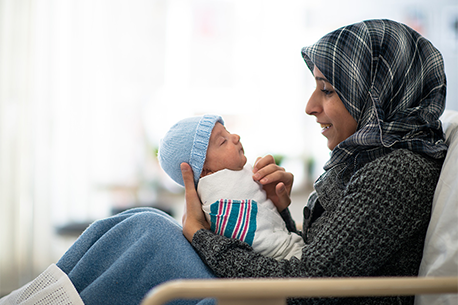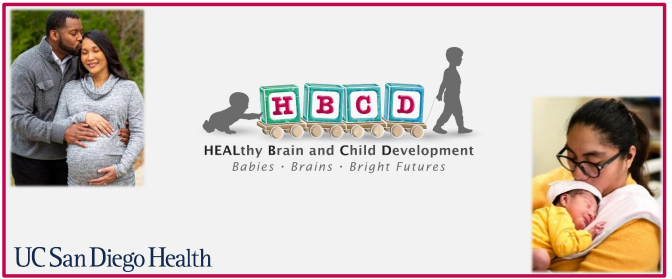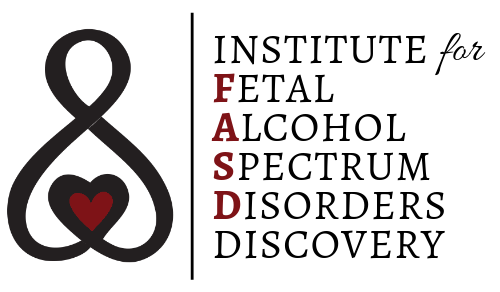Search results for: ユニークな701-100日本語 日本語学習内容 - 合格スムーズ701-100日本語 日本語版サンプル | 効果的な701-100日本語 学習資料 🔭 「 701-100日本語 」を無料でダウンロード☀ www.goshiken.com ️☀️ウェブサイトを入力するだけ701-100日本語学習関連題
Solving the Mysteries of the Baby Brain
Ofrézcase como voluntario/a para el Estudio Cerebro Sano y el Desarrollo Infantil (HBCD)
¿Se encuentra actualmente embarazada? Si es así, podría ser elegible para participar en un estudio de investigación sobre la salud y el desarrollo infantil.
Los investigadores de la UC San Diego están invitando a padres que se encuentren en la etapa del embarazo a participar en un estudio de investigación sobre la salud y el desarrollo infantil, que comienza en el embarazo y continúa hasta los 10 años de edad. El Estudio del Cerebro Sano y el Desarrollo Infantil (HBCD) será el primer esfuerzo a gran escala que analizará cómo crece y se desarrolla el cerebro de un niño/a en los primeros años de vida y cómo el entorno del niño/a influye en su desarrollo. El conocimiento obtenido a partir de esta investigación tendrá un impacto duradero en las futuras generaciones de niños/as, brindando información a los profesionales de la salud sobre los beneficios yriesgos de las exposiciones ambientales.

Las díadas madre-hijo serán observadas desde el embarazo hasta los 10 años de edad. Durante las visitas del estudio, se les pedirá que completen encuestas, proporcionen muestras como saliva y orina, y que su hijo/a realice exploraciones de imágenes del cerebro que son seguras y no invasivas (MRI, EEG) y miden laactividad cerebral, participen en evaluaciones de desarrollo y usen monitores de actividad, entre otras medidas.
Ser participante de este estudio es gratuito y se será compensado/a por su tiempo y traslados. Si desea obtener más información, complete el formulario a continuación y nos pondremos en contacto con usted.
La financiación para el Estudio HBCD es proporcionada por los Institutos Nacionales de Salud (NIH). Para más información sobre las actividades del estudio en su área local, contáctenos en: (858) 246-1753 or HBCD@health.ucsd.edu.
Si! Me gustaría aprender más sobre cómo participar en el estudio HBCD en la UCSD.

Dr. Charlotte Hobbs joins the faculty of the UC San Diego Division of Dysmorphology and Teratology and the Center for Better Beginnings.
Dr. Charlotte Hobbs joins the faculty of the UC San Diego Division of Dysmorphology and Teratology and the Center for Better Beginnings. Dr. Hobbs also serves as Vice President and Chief Research & Clinical Management Officer of Rady Children’s Institute Genomic Medicine.
Dr. Chambers receives the Health Sciences Women Leadership Award
Dr. Chambers receives the Health Sciences Women Leadership Award from the UC San Diego Office of Faculty Affairs. The award recognizes the leadership and extraordinary accomplishments of women leaders in health sciences.
Partner with Us!
Interested in working with the Center for Better Beginnings at UC San Diego?
The Center for Better Beginnings is dedicated to advancing maternal and child health through multiple programs. Housed in the University of California San Diego Department of Pediatrics, our team consists of world-renowned medical professionals, researchers, and dedicated staff who are actively engaged in public education and service and who are conducting cutting-edge research. Healthy pregnancies and healthy babies are our priority and our passion.
Our Programs At A Glance
MotherToBabyMotherToBaby is a no-cost information service that provides risk assessments for pregnant and lactating people and healthcare professionals. Focusing on environmental exposures during pregnancy and lactation such as medications, vaccines, maternal health conditions, substances of abuse, and more, we provide evidence-based, up-to-date information on whether or how these exposures could affect a pregnancy or a nursing infant. We also run MotherToBaby Pregnancy Studies, a research program seeking to understand how certain medications, vaccines, or health conditions may affect pregnancy. All MotherToBaby Pregnancy Studies are observational; those who participate are never asked to take or change any aspect of their current health routine. We enroll pregnant people across the U.S. and Canada, and participation takes place from the comfort of home. These studies are vital to generating the real-world data that can ultimately help clinicians and people who are pregnant understand what may be safe and what should be avoided in pregnancy. |
 |
Mommy’s Milk Research BiorepositoryMommy’s Milk is a first-of-its-kind research program that is dedicated to better understanding “liquid gold” and its many benefits for infants. We enroll breast/chestfeeding parents from across the U.S. The parent provides a sample of their milk as well as information from interviews, questionnaires, and medical records. All of this information is then securely stored and can be accessed by researchers who want to unravel the mysteries of human milk and how it influences child health and development. |
 |
The Institute for Fetal Alcohol Spectrum Disorders Discovery (IFASDD)The Institute for Fetal Alcohol Spectrum Disorders Discovery was founded to integrate education, screening, and research on Fetal Alcohol Spectrum Disorders (FASD) and to provide support to families affected by these conditions. Exposure to alcohol during pregnancy can cause a range of life-long physical, mental, behavioral, and/or learning disability-related effects. Research suggests that FASD may be as common as – if not more common than – Autism Spectrum Disorders. Led by Dr. Kenneth Lyons Jones, the physician who co-identified fetal alcohol syndrome in 1973, the Institute is the nation’s leading epicenter for work to prevent alcohol-exposed pregnancies and to assist those who are affected. As a multidisciplinary center, we’ve assembled clinicians, researchers, parent advocates, and educators as a think-tank for this under-recognized disorder.
|
 |
Follow Us on Social Media
Michelle Ann Caesar, MPH
Michelle Ann Caesar is a graduate student researcher in the Center of Better Beginnings at the University of California San Diego. Michelle Ann earned her B.A. in Public Health Policy at the University of California, Irvine and her MPH in Epidemiology & Biostatistics and Maternal & Child Health at Boston University where her research focused on the life course, school health services, substance use in adolescents, and risk factors in pregnancy. She is currently a student in the Joint Doctoral Program in Epidemiology at UC San Diego and San Diego State University.
Michelle Ann’s research primarily focuses on in utero exposures and birth outcomes, risk factors for pregnancy and delivery complications, and gynecologic oncology.
Jocelyn Burridge, MPH
Jocelyn Burridge is a graduate student researcher in the Center of Better Beginnings at the University of California San Diego. She completed her undergraduate degree in biomedical engineering at the University of Michigan, where she focused her research on medical device design in obstetrics and anesthesia for low resource settings. She then completed her Master of Public Health in Population and Health Sciences at the University of Michigan, before beginning her Joint Doctoral Program in Epidemiology at UC San Diego and San Diego State University.
Jocelyn’s research interests primarily focus on maternal exposures during pregnancy and adverse outcomes in offspring. She is particularly interested in how emerging genomic technologies can improve maternal and infant short and long-term health outcomes.
Center for Better Beginnings Launches Its First Study on Lupus Treatment During Pregnancy
On September 23, 2022 the Center for Better Beginnings at UC San Diego began enrollment for its first study on the treatment of lupus during pregnancy. The study will recruit 400 pregnant people over a five-year period to evaluate use of the lupus drug Benlysta® (belimumab) in pregnancy. Benlysta® is used to treat the most common type of lupus, systemic lupus erythematosus (SLE), as well as lupus nephritis. Currently there is limited information on the drug’s use in pregnancy.
The study will be the Center’s first to focus on a treatment specifically for lupus, and it will be led by perinatal epidemiologist Dr. Christina Chambers, Co-Director of the Center for Better Beginnings and Chief of the Environmental Science and Health Division at UC San Diego. Participants will be enrolled into the Center’s MotherToBaby Pregnancy Studies research program.
“We know lupus can raise the risk of pregnancy complications, so it’s important for both the mom and her developing baby that this condition to be well-managed during pregnancy,” said Chambers. “So, when treatments for lupus like belimumab are available, we want to do our best to gather information about those pregnancies where this medication has been used.”
The study is enrolling those with and without exposure to Benlysta®, and will provide critical information on the use of this medication during pregnancy. Participants will not be asked to change any part of their health care routine, including medications, nor will they be asked to travel. MotherToBaby Pregnancy Studies are conducted by the non-profit Organization of Teratology Information Specialists and coordinated at the Center for Better Beginnings.
More about OTIS and MotherToBaby
The Organization of Teratology Information Specialists (OTIS) is a professional scientific society made up of individuals engaged in assessing and evaluating risks to pregnancy and breastfeeding from environmental exposures. Members include, but are not limited to, specialists in the fields of obstetrics and gynecology, pediatrics, genetics, dysmorphology, perinatal epidemiology, teratology, behavioral teratology, pharmacy, genetic counseling, nursing, midwifery, maternal and child health, public health, and includes experts that provide MotherToBaby services and researchers that conduct MotherToBaby Pregnancy Studies. MotherToBaby is a suggested resource by many federal agencies including the Centers for Disease Control and Prevention (CDC). MotherToBaby is supported by the Health Resources and Services Administration (HRSA) of the U.S. Department of Health and Human Services (HHS) as part of an award totaling $6,000,000 with zero percentage financed with non-governmental sources. The contents of this release are those of the author(s) and do not necessarily represent the official views of, nor an endorsement, by HRSA, HHS or the U.S. Government. To learn more about MotherToBaby and OTIS, please visit MotherToBaby.org.
Center Researchers Find No Infectious SARS-CoV-2 in Breast Milk from 110 Lactating Individuals
While viral materials from SARS-CoV-2 (the virus that causes COVID-19) has sometimes been detected in the breast milk of lactating individuals infected with COVID-19, it’s been uncertain whether this could lead to COVID-19 infection in a breastfed infant due to the small size of prior studies. Our new study, which was published in the journal Pediatric Research, examined this very question with a larger sample of chest/breastfeeding parents.
What did we do? Our Mommy’s Milk research program recruited 110 lactating individuals across the United States between March and September 2020. This included individuals who had a SARS-CoV-2 infection confirmed by RT-PCR, those who had symptoms of COVID-19 but were not tested, those who had symptoms but tested negative for SARS-CoV-2 by RT-PCR, and those exposed to an infected person. We collected information by interviewing moms and collecting two chest/breast milk samples: one when their symptoms peaked and a second milk collection after they had recovered.
What did we find? While we found that RNA (a type of genetic material) from SARS-CoV-2 can be infrequently detected in chest/breast milk after recent infection, we found no evidence that chest/breast milk contains infectious virus. We also found no evidence that breast/chest milk from a COVID-19 infected parent represents a risk factor for transmission of infection to infants.
So what’s the take-away? Lead author Dr. Paul Krogstad, a pediatric infectious disease researcher at the David Geffen School of Medicine at UCLA, said it best: “Breastmilk is an invaluable source of nutrition to infants. In our study, we found no evidence that breastmilk from mothers infected with COVID-19 contained infectious genetic material and no clinical evidence was found to suggest the infants got infected, which suggests breastfeeding is not likely to be a hazard.”
To learn more about our ongoing studies at Mommy’s Milk, visit https://MommysMilkResearch.org/research/ or email MilkStudy@health.ucsd.edu.
UC San Diego launches the Human Milk Institute
UC San Diego launches the Human Milk Institute to accelerate research into the nature, biology, and therapeutic potential of human milk to prevent or treat infant and adult diseases. The institute harmonizes efforts across multiple, ongoing programs at UC San Diego related to human milk and lactation, including the Center’s Mommy’s Milk Human Milk Research Biorepository.








